Is Labor ready to face the coming financial storm?
The Prime Minister must reinvent his government for challenges on a scale he never expected.
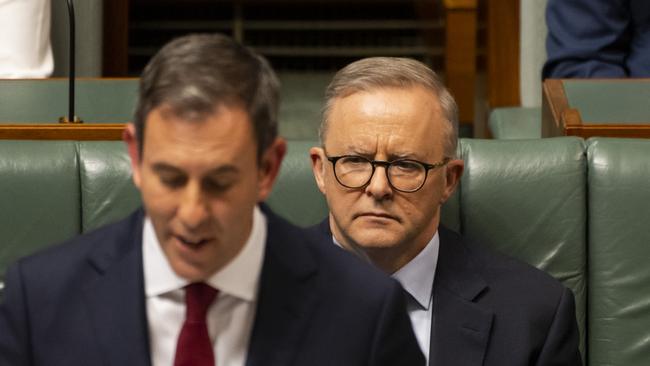
Jim Chalmers emerged this week as the pivotal figure in this conundrum. Labor’s fresh mission this term is to recast spending, tax, energy and productivity policy against fierce political resistance. This flows from the Treasurer’s unusual opening budget – defined more by the challenge it outlined than the actual decisions it took.
The Prime Minister must reinvent his government for challenges on a scale he never expected. It means a new political narrative. Blaming the Morrison government has hit the exhaustion point. After the Chalmers budget, Labor cannot duck responsibility for the condition of the country. Peter Dutton has got a rich script to weaponise against Labor.
Albanese won campaigning on compassion and an economy for people – and the Opposition Leader now turns this against him. Dutton’s charge is that Labor is failing people, that “everything is going up except your wages”, that Labor has broken its cost-of-living and energy price reduction pledges.
The 2022 election now looms as one of the great political frauds of our history – the serious budget and productivity challenges Australia faced were addressed by neither side.
Now they are exacerbated by more intense global inflation, the war in Ukraine and flawed control of domestic spending.
The agenda on which Labor won is no longer the agenda for the times. The challenges Chalmers outlined in his budget demand audacity, not small-target policy. Getting the tone right won’t do the job. There is a new phase of history breaking all over this government.
The irony, however, is that while Labor prides itself on being a government of adults that talks honestly to the people, it has yet to sort the plan or policies to meet the sweeping structural realignments that Australia needs.
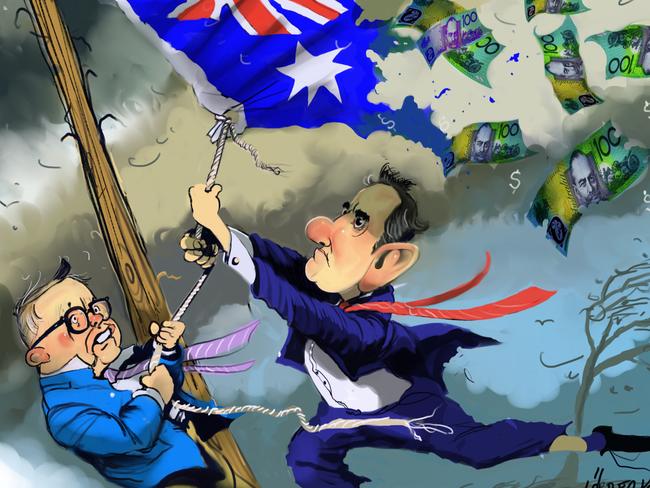
Such omission is not adult behaviour. The problem is enunciated in the budget numbers, yet the solution remains elusive. By this process Chalmers deliberately puts more pressure on himself, seeks to construct a narrative for change and conscripts his colleagues to policy innovations they never imagined on taking office.
No simple prescription will fit the task. With the budget forecasting electricity prices to rise an extra 56 per cent across two years and gas prices to increase by 20 per cent in both the next two years, a form of regulatory intervention is essential to curb prices – not cash handouts or rebates to ease consumer pain, a futile step that makes inflation worse.
Acting to limit gas prices, not just expand supply, is fraught with risk but the slogan that renewables “are the cheapest form of energy” is worthless before this problem. Without action Labor risks having its credibility ruined given its $275 energy price reduction campaign pledge has become Dutton’s weapon of choice.
There are two more policy certainties. The overall tax take in Australia will rise under Labor, the big debate being: who pays more? The politics will be tough. The rate of spending increases will slow, thereby causing many political tensions – but none greater than the inevitable and agonising debate over reducing out-of-control NDIS spending, now increasing on average at 13.8 per cent yearly. How the government navigates these pathways remains unknown.
Labor is not alone. Western democracy is at a moment of high testing. Financial markets are in turmoil as central banks engage in synchronised interest rate increases to beat inflation at the risk of domestic recessions. Rich nations strive to stabilise their debts and find new sources of growth, yet leaders are intimidated and compromised by severe political backlashes. Britain’s Conservative government broke under these pressures. The global situation will only worsen as the US Federal Reserve pursues its relentless quest to beat inflation.
The opening page of the budget begins: “The global economic environment has deteriorated sharply” and warns “the risk of recession across major advanced economies has risen and China’s growth outlook has weakened”.
Almost on cue, the day after the budget the September quarter consumer price index showed higher than expected inflation at 1.8 per cent, raising alarm that inflation will exceed the budget forecast peak of 7.75 per cent, which means a higher interest rate tightening by the Reserve Bank, lower economic growth, worse living standards and heightened public concerns.
“Inflation is the dragon we need to slay,” Chalmers told a packed National Press Club audience this week. Yet Labor’s task grows more daunting.
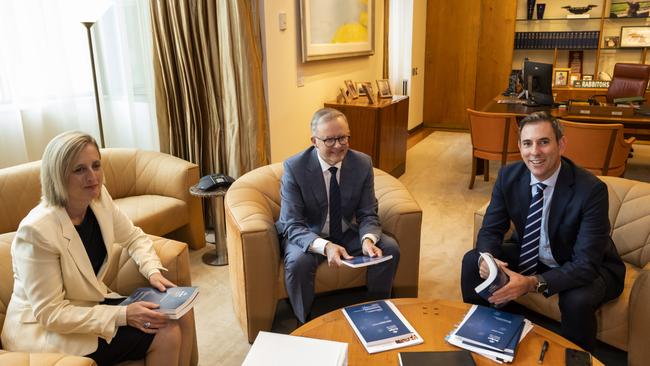
It must work to break the inflation cycle with its high energy price component while embarking on repair of the nation’s untenable finances, with a structural budget deficit revealed to be $50bn annually, the gap between spending and tax receipts.
The global crisis is not just economic. It is political. Western democratic leadership is under severe strain. Australia is better placed than most nations but Chalmers, having just visited Washington for a G20 meeting, is alert to the complex economic and political dimensions. He needs to foster a new policy direction that proves Labor’s mettle as manager for the times.
That means many things: don’t act stupid like Liz Truss; don’t be spooked into feeble gestures that fail to deliver; hold the national conversation that Chalmers invokes – but recognise that government must lead the way. That hasn’t happened yet. Empathy is a fine quality for a prime minister and treasurer but no substitute for leadership.
Yet the industrial relations bill Labor has fast-tracked into parliament in budget week sends a different message. It is an assertionof fidelity to trade unions, an expansion of multi-employer bargaining, it injects extra complexity into the system and it is staunchly opposed by the major employer bodies.
The week Labor wanted to send an economic responsibility message from its budget, it stubbornly chose to send the opposite message from its IR package, embracing a regulatory method unlikely to deliver a better wages model. It is a bad omen.
The budget forecasts are dire. Inflation will persist longer than previously expected; economic growth is downgraded to a vulnerable 1.5 per cent in 2023-24; the Reserve Bank will lift the cash rate at least to 3.35 per cent and maybe more; real wages will not become positive until 2024, perilously close to the next election; the budget deficit will deteriorate over the decade, constituting 1.9 per cent of GDP at 2032-33 compared with 0.7 per cent in the Frydenberg budget last March.
Chalmers had deep experience in policymaking before he entered parliament. With his doctorate on Paul Keating and having been principal adviser to Wayne Swan for six years, Chalmers knows the cycles of Labor history, the thinking of the Treasury Department and the reform policy variations from Labor’s past that might guide his deliberations. He said this week he had been in 17 budget lockups and ventured, probably correctly, this was more than any other current MP.
His first budget was disciplined in rejecting demands for cash handouts to cushion cost-of-living pressures. The cabinet backed him. Yet the budget was gun-shy. Not only did it do little to face the financial storm but it failed to offer a medium-term fiscal strategy or guidance on how Labor will address the structural deficit.
The week was spent with journalists trying to discern meaning from the hints, signals and rhetorical scraps Chalmers offered. Upholding his promise to be upfront with the public, Chalmers wrote into his budget speech the unqualified warning: “Australians know there are hard days to come and hard decisions to accompany them.” But there’s a missing link.
Head of Macroeconomics Advisory consulting Stephen Anthony told Inquirer: “The budget is a stocktake of where things have gotten to and it’s frank. We have a difficult row to hoe. But this raises the question: why aren’t we acting now? Why does Jim Chalmers get the luxury of delay in addressing this mess? In the past when treasurers identified circumstances that dictated remedial action they acted quickly.
“We are in the fiscal quicksand and sinking. If our situation is as grim as the Treasurer says why does he need another six months to sell a message of spending reductions or increased taxes or both? What is the proper course of leadership – acting or having a conversation?”
The formula Chalmers used is that Labor’s redesigned policy will constitute four elements – spending restraint, trimming spending where possible, tax reform and ensuring public investment delivers an economic dividend. Under questioning, he ruled out any change to the rate or coverage of the GST, affirming a longstanding Labor axiom.
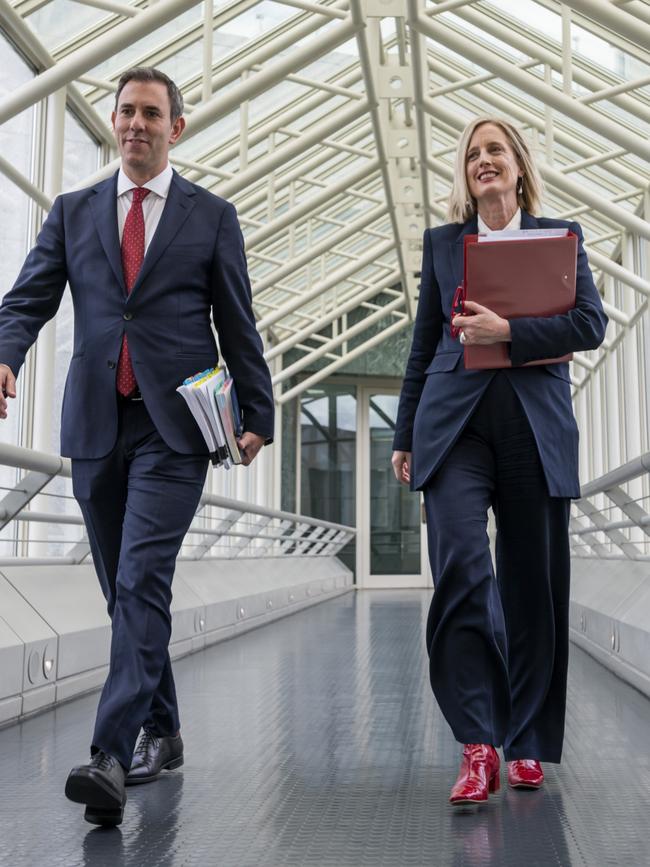
Indeed, this represented his most strongly expressed opinion. Chalmers made clear his problem with an expanded GST was “the distributional impact”. Obviously, Labor has no stomach for such a contentious move. This has consequences because, linked with Labor’s scepticism about stage three income tax cuts, it suggests under Labor’s tax reform there is little prospect of reducing our counter-productive reliance on personal income tax.
What is more likely is that Labor will follow the work done by Treasury on tax expenditures (with the budget providing a useful table of tax expenditures showing the huge exemptions to revenue they involve). Concessions for the family home and superannuation sit at the top of the list. A glance down the long list confirms what has been known – removing tax expenditure concessions is a politically fraught process.
Chalmers indicated a windfall profits tax was not on his agenda at this point. But he kept alive the option of strengthening the current petroleum resource rent tax which is under review by the Treasury. While Chalmers said changing the PRRT was not his current focus, he would listen to Treasury’s advice when the review was complete.
In the budget statement on economic and fiscal strategy there was no mention of a ceiling on future tax levels as a proportion of GDP. That restraint is gone; the conclusion is obvious. Tax reform will equate to a higher tax burden. The government has yet to turn its mind to substantial tax reform but Chalmers this week put tax reform on the agenda in his post-budget interviews. This involves a cautious shifting of the political parameters since Labor has no mandate for tax changes other than the multinational tax reform introduced in the budget.
But the fiscal pressures will not abate. The budget shows the deficit deteriorates significantly after 2022-23. It shows net debt rising from $572bn in 2022-23 to $767bn in 2025-26. By that year gross debt is projected at $1.159 trillion or 43 per cent of GDP. Yet there is little evidence the public is worried about the deficit or debt.
Indeed, it has been taught not to worry. There was broad bipartisanship for the huge fiscal support packages of the Morrison government during the pandemic that saved the economy and jobs. Labor needs to break the psychology of easy spending that arose during the period – but the jury is out on whether it possesses the conviction to do the job.
Chalmers brought down a disciplined budget. But not as disciplined as he pretended. The budget shows net government decisions weakened the bottom line by $9.782bn across the four years of forward estimates. He points, however, to $22bn worth of saved spending as revealing discipline now and pointing to future spending restraint.
“The days of pretending we don’t have structural pressures on the budget are over,” he said. The two biggest spending drivers are the NDIS and the interest payments on government debt. Beyond this, the main drivers are the Age Pension, Medicare, defence, aged care and hospitals. Savings in these will be exceedingly difficult to extract.
Chalmers’ press club speech offered an insight into Labor’s self-image. He said Albanese, by changing the tone of politics, had changed the substance as well. This went to “how a government ought to behave, how a cabinet ought to operate, how we discuss issues, how we deliberate and how we come to decisions”.

An improvement in process from the Morrison government was necessary. But Labor will be judged by results. There were times this week when the government was exposed on energy, tax and spending policy, unable to offer a coherent sense of its future directions. It will need to get its collective act together.
Albanese will come under attack from two different quarters – from populist retail politics for not doing enough to cushion people as energy prices, interest rates and higher inflation bite deeper and then from the school of economic responsibility asking when and how Labor will address the structural and growth deficits holding back enterprise and prosperity. With the Chalmers budget Labor is put on notice. The days of kicking the can down the road are over. The historical times in which Labor governs will require decisive action and reform and an acute sense of balance between the politics and the economics.




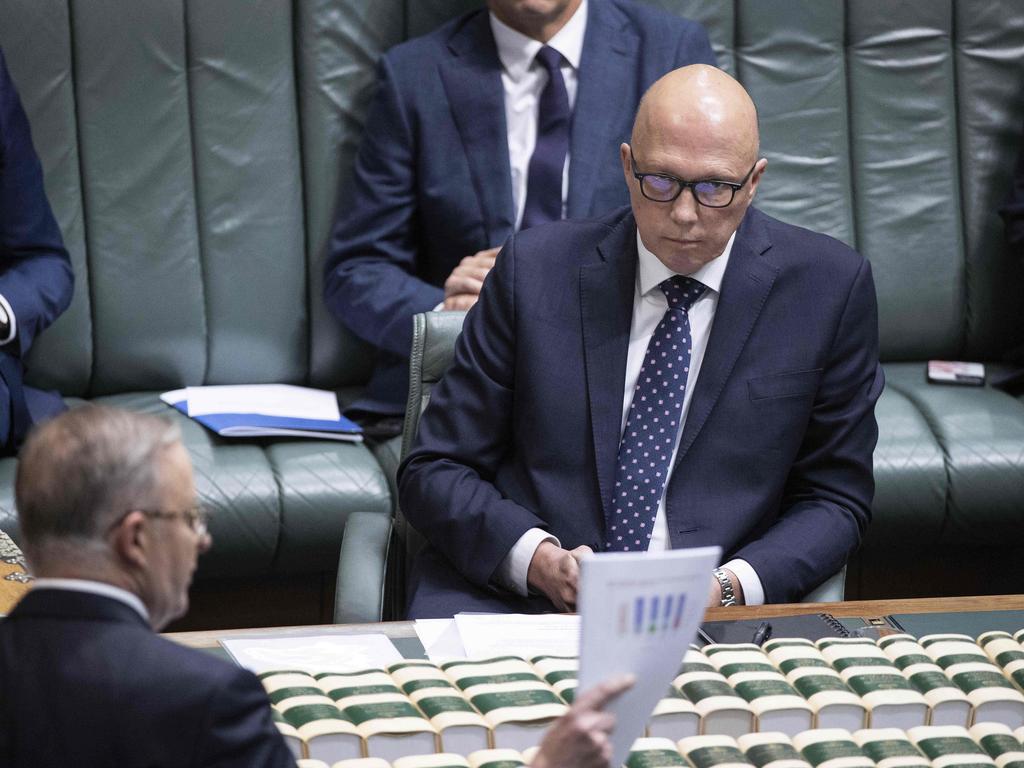

Events have upended the assumptions on which Anthony Albanese campaigned and won office just five months ago. Labor’s destiny now is to confront a complex economic challenge that suggests one of two scenarios – either this will become a great Labor reforming government or it will fail.